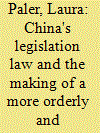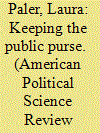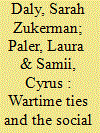| Srl | Item |
| 1 |
ID:
064551


|
|
|
| 2 |
ID:
127830


|
|
|
|
|
| Publication |
2013.
|
| Summary/Abstract |
It is widely believed that rents from windfall revenue undermine accountability. An enduring explanation is that windfalls free leaders from the need to tax, producing a quiescent population. Yet, there is little direct evidence of how windfalls and taxes affect citizen political action. I use novel revenue and information experiments to examine whether and why windfalls (compared to taxes) affect how citizens participate in politics. The experiments were embedded in a public awareness campaign conducted with 1,863 citizens in Indonesia. The results-from an original survey and postcard campaign-indicate that the tax treatment increased monitoring and anti-incumbent political action. Yet, when given spending information, citizens in the windfall treatment cared just as much about misused revenue as those in the tax treatment. The findings have important implications for understanding not only how revenue affects citizen political behavior but also how people acquire and process information on government spending
|
|
|
|
|
|
|
|
|
|
|
|
|
|
|
|
| 3 |
ID:
173210


|
|
|
|
|
| Summary/Abstract |
While ex-combatant reintegration is vital to successful transitions from war to peace, some former fighters turn to crime following demobilization. Such criminality undermines the consolidation of political order. Leading theories of crime participation emphasize the role of both individual economic opportunities and factors related to social ties. Yet, we still know little about the social logic of ex-combatant criminality and how social and economic factors relate as drivers of crime participation. This article presents a theory of how wartime social ties – namely, vertical ties to former commanders and horizontal ties to ex-combatant peers – influence ex-combatant crime on their own and via their relationship to economic opportunity costs. We use the theory to derive predictions in the context of Colombia, and then test them with a combination of administrative data and high-quality original survey data. We find that both vertical and horizontal wartime ties are powerful drivers of ex-combatant criminality. Our evidence indicates that wartime ties mitigate the risks of criminal behavior by facilitating the transmission of criminal capabilities and pro-crime social norms. We do not find that economic conditions moderate the effect of wartime times nor do we find any indication that economic opportunity costs, on their own, predict criminality. These findings underscore the importance of wartime ties – both vertical and horizontal – to understanding post-conflict transitions and designing reintegration interventions.
|
|
|
|
|
|
|
|
|
|
|
|
|
|
|
|